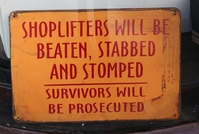 One of the most common questions I get asked when I get a phone call from somebody who has recently been arrested is “can my case be dismissed if the police did not read me my rights when I was arrested?” The answer to that question requires an understanding of the Fifth Amendment to the United States Constitution. Everyone has heard of the Fifth Amendment, especially because of television crime shows, but let’s take a closer look at why the Fifth Amendment is important, what it is and what it does.
One of the most common questions I get asked when I get a phone call from somebody who has recently been arrested is “can my case be dismissed if the police did not read me my rights when I was arrested?” The answer to that question requires an understanding of the Fifth Amendment to the United States Constitution. Everyone has heard of the Fifth Amendment, especially because of television crime shows, but let’s take a closer look at why the Fifth Amendment is important, what it is and what it does.
The Fifth Amendment creates a number of rights that apply to people facing criminal and civil legal proceedings. First, it guarantees a citizen the right to a grand jury. Second, it forbids “double jeopardy.” Third, it requires that “due process of law” be part of any Court proceeding that denies a citizen “life, liberty or property.” Fourth, it requires that the government compensate a citizen when it takes their private property for public use. Fifth, if protects citizens from “self-incrimination.” That last Fifth Amendment right, the right against self-incrimination, is the one that is commonly associated with the “Miranda Rights.” Self incrimination is basically when you make a statement that exposes yourself to legal or criminal responsibility. Think of it as making a statement that ends up being a confession. It’s when you are admitting to a crime, or making a confession. The Fifth Amendment protects citizens from being forced or coerced to testify against themselves. Self-incrimination is prohibited by the Fifth Amendment to the United States Constitution. So when you hear that someone has “taken the Fifth,” this means that they are refusing to testify in court or talk to the police. This right against self-incrimination is one of the basic principles of American Constitutional Law. It’s the absolute right to remain silent when you are being questioned by the police. But just like any other constitutional right, this right is not absolute. There are limitations.
The seminole case that deals with the Fifth Amendment is the U.S. Supreme Court case of Miranda v. Arizona. Arguably the most well-known, or most mentioned, criminal case. Let’s talk a little about this Supreme Court case so we can get a better understanding of what this case did and how it applies to today. Miranda v. Arizona was actually four different cases involving custodial interrogations that were consolidated into one case. The first case involved Miranda and that’s why it became known as the Miranda case. But it actually involved four different cases involving criminal prosecutions and custodial interrogations. In all cases, the defendants were arrested by the police, taken down to the police station, and interrogated for several hours. All of the defendants made confessions to the police that prosecutors tried to use against them in court. Prior to this case, the right against self-incrimination was thought of as applying only to proceedings in court. But in this case, the Supreme Court extended and applied the 5th Amendment to proceedings that happened before the case went to court. The court applied the right against self-incrimination in the 5th Amendment to all criminal proceedings that begin once a criminal defendant is deprived of their freedom of action. And here is where we find the main limitation in Miranda. The rights afforded in Miranda apply to custodial interrogations. You are in custody if you are deprived of your freedom of action in any significant way. It doesn’t matter if the interrogation occurs in the jail, at the police station, at the scene of a crime on a busy street, or in the middle of nowhere. If you are not free to leave, then you are considered to be in custody and that’s when the Miranda warnings have to be given. Once it is established that you were in custody and the police start questioning you, in order for the prosecutor to be able to use the statements that you make to them in court, the police have to read you your Miranda Rights. Those rights have to warn you that you have the right to remain silent. If you say anything what you say can be used against you in a court of law. You have the right to consult with a lawyer and have that lawyer present during any questioning. If you cannot afford a lawyer, one will be appointed for you if you so desire. If you choose to talk to the police you have the right to stop the interview at any time. Very rarely have I seen TV shows mention this last warning. And this is very important because if you are ever questioned, you have the right to demand that they provide a lawyer to you free of charge before answering any questions. Once you assert that right, the police must stop all questioning until and unless they provide a lawyer for you. You have the right to demand a lawyer at any time during the interrogation. From my experience, I don’t know if I have ever seen the police actually provide a lawyer at this point once it is requested by the defendants.
 Chicago Criminal Lawyer Blog
Chicago Criminal Lawyer Blog











 Clients that are charged with Retail Theft frequently call me a few weeks after they are arrested and tell me that they received a letter from the store’s lawyers demanding money. Sometimes, they receive this letter even if they haven’t been criminally charged for the Shoplifting. They usually have two questions when they receive that letter. The first question is whether this means that if they pay the amount they are asking for will that mean that their case is dismissed? The second question is whether they have to pay the amount they are demanding. I will explain to you what I tell them and what that letter means.
Clients that are charged with Retail Theft frequently call me a few weeks after they are arrested and tell me that they received a letter from the store’s lawyers demanding money. Sometimes, they receive this letter even if they haven’t been criminally charged for the Shoplifting. They usually have two questions when they receive that letter. The first question is whether this means that if they pay the amount they are asking for will that mean that their case is dismissed? The second question is whether they have to pay the amount they are demanding. I will explain to you what I tell them and what that letter means.
 The Lake County State’s Attorney’s office has announced a new program that allows first time misdemeanor and felony offenders an opportunity to avoid having a criminal conviction permanently on their record. The Lake County State’s Attorney’s Office calls it the Alternative Prosecution Program. If the crime involves violence the offender is not eligible for the program. The Lake County State’s Attorney’s office makes the final decision on whether an offender will be allowed into the program. Here’s how it works.
The Lake County State’s Attorney’s office has announced a new program that allows first time misdemeanor and felony offenders an opportunity to avoid having a criminal conviction permanently on their record. The Lake County State’s Attorney’s Office calls it the Alternative Prosecution Program. If the crime involves violence the offender is not eligible for the program. The Lake County State’s Attorney’s office makes the final decision on whether an offender will be allowed into the program. Here’s how it works. What determines how serious a particular criminal charge in Illinois is depends on the potential criminal penalty that the crime carries. The lowest classification of crimes in Illinois is called a Misdemeanor. The highest classification of crimes in Illinois is called a Felony. Generally, any jail sentence for a Misdemeanor must be served in County Jail. Any jail sentence for a Felony must be served in State Prison. Any potential jail sentence for a Misdemeanor is under one year while any potential jail sentence for a Felony is one year or more. The range of penalties for Misdemeanors and Felonies in Illinois depend on what Class the crime you are charged with falls in. Every criminal offense is classified as a Felony or a Misdemeanor and assigned a specific Class. An experienced and knowledgeable criminal defense lawyer will know whether you are being charged with a Felony or a Misdemeanor and what class your criminal charge falls in.
What determines how serious a particular criminal charge in Illinois is depends on the potential criminal penalty that the crime carries. The lowest classification of crimes in Illinois is called a Misdemeanor. The highest classification of crimes in Illinois is called a Felony. Generally, any jail sentence for a Misdemeanor must be served in County Jail. Any jail sentence for a Felony must be served in State Prison. Any potential jail sentence for a Misdemeanor is under one year while any potential jail sentence for a Felony is one year or more. The range of penalties for Misdemeanors and Felonies in Illinois depend on what Class the crime you are charged with falls in. Every criminal offense is classified as a Felony or a Misdemeanor and assigned a specific Class. An experienced and knowledgeable criminal defense lawyer will know whether you are being charged with a Felony or a Misdemeanor and what class your criminal charge falls in. Because of the widespread use of marijuana in our society, it is common to see criminal cases involving people who have been caught with marijuana and charged with Possession of Marijuana. While several States have legalized the recreational use of marijuana, Illinois is not one of those States. The furthest Illinois has gone to legalizing marijuana is to enact the Medical Marijuana statute which allows for the medical use of marijuana. Unless you have been approved to use Medical Marijuana, it is illegal to use and possess any amount of marijuana in Illinois. So what could happen to you if you are arrested by the police and charged with possession of marijuana?
Because of the widespread use of marijuana in our society, it is common to see criminal cases involving people who have been caught with marijuana and charged with Possession of Marijuana. While several States have legalized the recreational use of marijuana, Illinois is not one of those States. The furthest Illinois has gone to legalizing marijuana is to enact the Medical Marijuana statute which allows for the medical use of marijuana. Unless you have been approved to use Medical Marijuana, it is illegal to use and possess any amount of marijuana in Illinois. So what could happen to you if you are arrested by the police and charged with possession of marijuana? Cook County Chief Judge Timothy Evans has issued an order which makes the greatest attempt yet to deal with overcrowding in Cook County Jail which is caused by defendants being forced to sit in jail while their cases work their way through the Cook County criminal justice system simply because they cannot afford to post the bond needed to walk out of jail. Estimates place the number of defendants who are sitting in Cook County Jail just because they can’t afford to post bond at between 250 to 300 inmates per day. Most of those bonds are for $1,000 or less. This problem plays a major role in the overcrowding of the 9,000 inmate Cook County Jail. The overcrowding problem at Cook County Jail is causing a major strain on Cook County’s limited budget resources.
Cook County Chief Judge Timothy Evans has issued an order which makes the greatest attempt yet to deal with overcrowding in Cook County Jail which is caused by defendants being forced to sit in jail while their cases work their way through the Cook County criminal justice system simply because they cannot afford to post the bond needed to walk out of jail. Estimates place the number of defendants who are sitting in Cook County Jail just because they can’t afford to post bond at between 250 to 300 inmates per day. Most of those bonds are for $1,000 or less. This problem plays a major role in the overcrowding of the 9,000 inmate Cook County Jail. The overcrowding problem at Cook County Jail is causing a major strain on Cook County’s limited budget resources. Last week, Kane County State’s Attorney, Joe McMahon, reported that Kane County Prosecutors have seen a rise in the number of criminal cases filed in Kane County in the first six months of this year compared to last year. McMahon reports that felony filings are up 15.7% compared to the same period last year. The increase in criminal cases in Kane County is happening with misdemeanor and traffic cases as well. In the first six months of 2017, 1,247 new felony cases were filed. During the same period last year, 1,078 cases were filed. Aurora, the largest city in Kane County, has seen a drop in the number of new felony cases. Most criminal cases in Kane County come from Aurora. The Village of Carpentersville has seen a rise in the number of Retail Theft cases. Carpentersville police attribute this to the opening of a new Walmart in Carpentersville. Elgin, the second largest city in Kane County, has seen a rise in violent crimes. McMahon is concerned with the increase in the number of criminal cases filed in Kane County since the number of criminal cases filed increased in 2016 as well.
Last week, Kane County State’s Attorney, Joe McMahon, reported that Kane County Prosecutors have seen a rise in the number of criminal cases filed in Kane County in the first six months of this year compared to last year. McMahon reports that felony filings are up 15.7% compared to the same period last year. The increase in criminal cases in Kane County is happening with misdemeanor and traffic cases as well. In the first six months of 2017, 1,247 new felony cases were filed. During the same period last year, 1,078 cases were filed. Aurora, the largest city in Kane County, has seen a drop in the number of new felony cases. Most criminal cases in Kane County come from Aurora. The Village of Carpentersville has seen a rise in the number of Retail Theft cases. Carpentersville police attribute this to the opening of a new Walmart in Carpentersville. Elgin, the second largest city in Kane County, has seen a rise in violent crimes. McMahon is concerned with the increase in the number of criminal cases filed in Kane County since the number of criminal cases filed increased in 2016 as well. This is one of the more common questions that I get asked when people call me wanting advice about how to deal with a situation like this. Many people think that as long as it’s not the police asking questions, they have nothing to worry about. Nothing can be further from the truth. If your employer is suspecting that you stole something and they want you to come in to the office to discuss the matter, you need to be aware of how dangerous this situation can be. This situation can be more dangerous than talking to the police. Let me explain why.
This is one of the more common questions that I get asked when people call me wanting advice about how to deal with a situation like this. Many people think that as long as it’s not the police asking questions, they have nothing to worry about. Nothing can be further from the truth. If your employer is suspecting that you stole something and they want you to come in to the office to discuss the matter, you need to be aware of how dangerous this situation can be. This situation can be more dangerous than talking to the police. Let me explain why. A Pre-trial conference is the usual way that a criminal case is resolved in Illinois without the need to go to trial. The Pre-trial conference is a meeting that occurs between the prosecutor, the defense lawyer, and the judge. The meeting is usually, but not always, behind closed doors, and the parties all get together to discuss the case to see if there’s a way to work out an agreement short of trial. Illinois Supreme Court Rule 402 allows for this conference to happen and sets forth the requirements for such a conference to occur. That’s why this type of conference is commonly called a “402 Conference” by lawyers and judges.
A Pre-trial conference is the usual way that a criminal case is resolved in Illinois without the need to go to trial. The Pre-trial conference is a meeting that occurs between the prosecutor, the defense lawyer, and the judge. The meeting is usually, but not always, behind closed doors, and the parties all get together to discuss the case to see if there’s a way to work out an agreement short of trial. Illinois Supreme Court Rule 402 allows for this conference to happen and sets forth the requirements for such a conference to occur. That’s why this type of conference is commonly called a “402 Conference” by lawyers and judges.